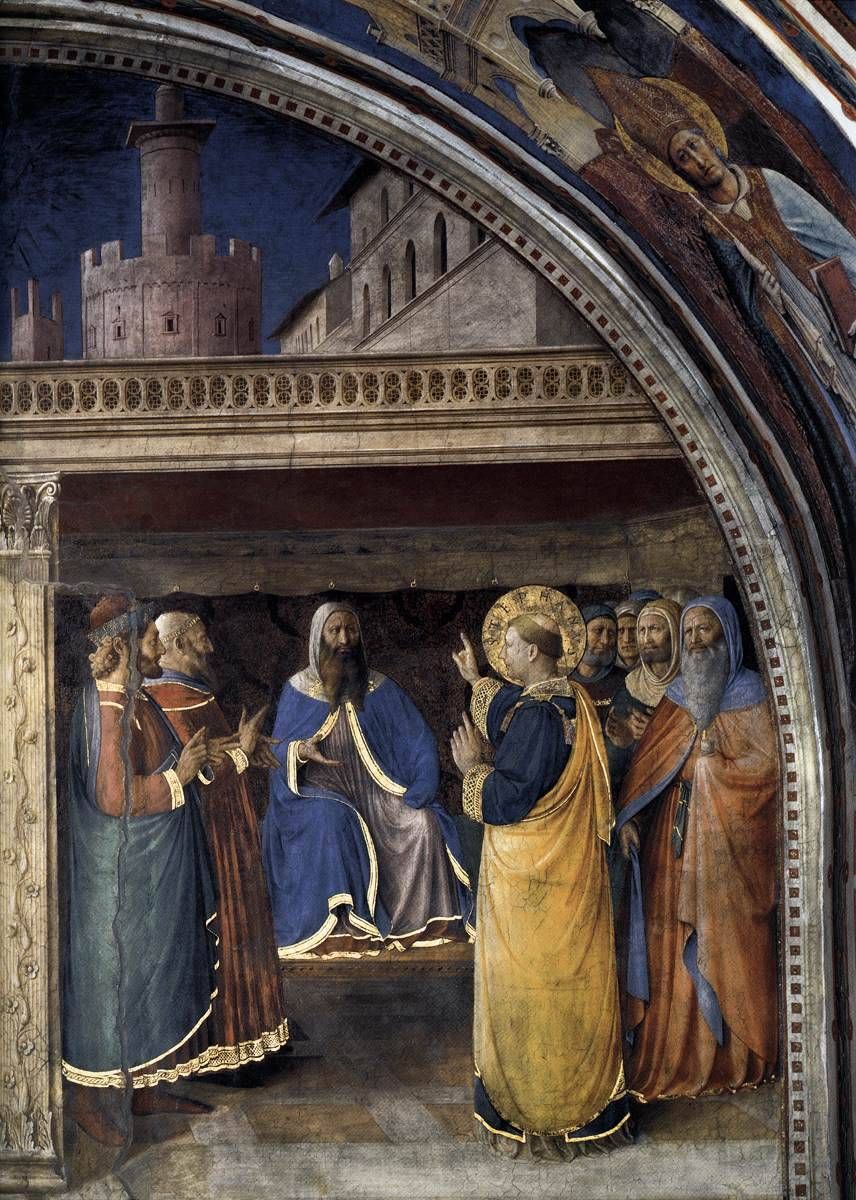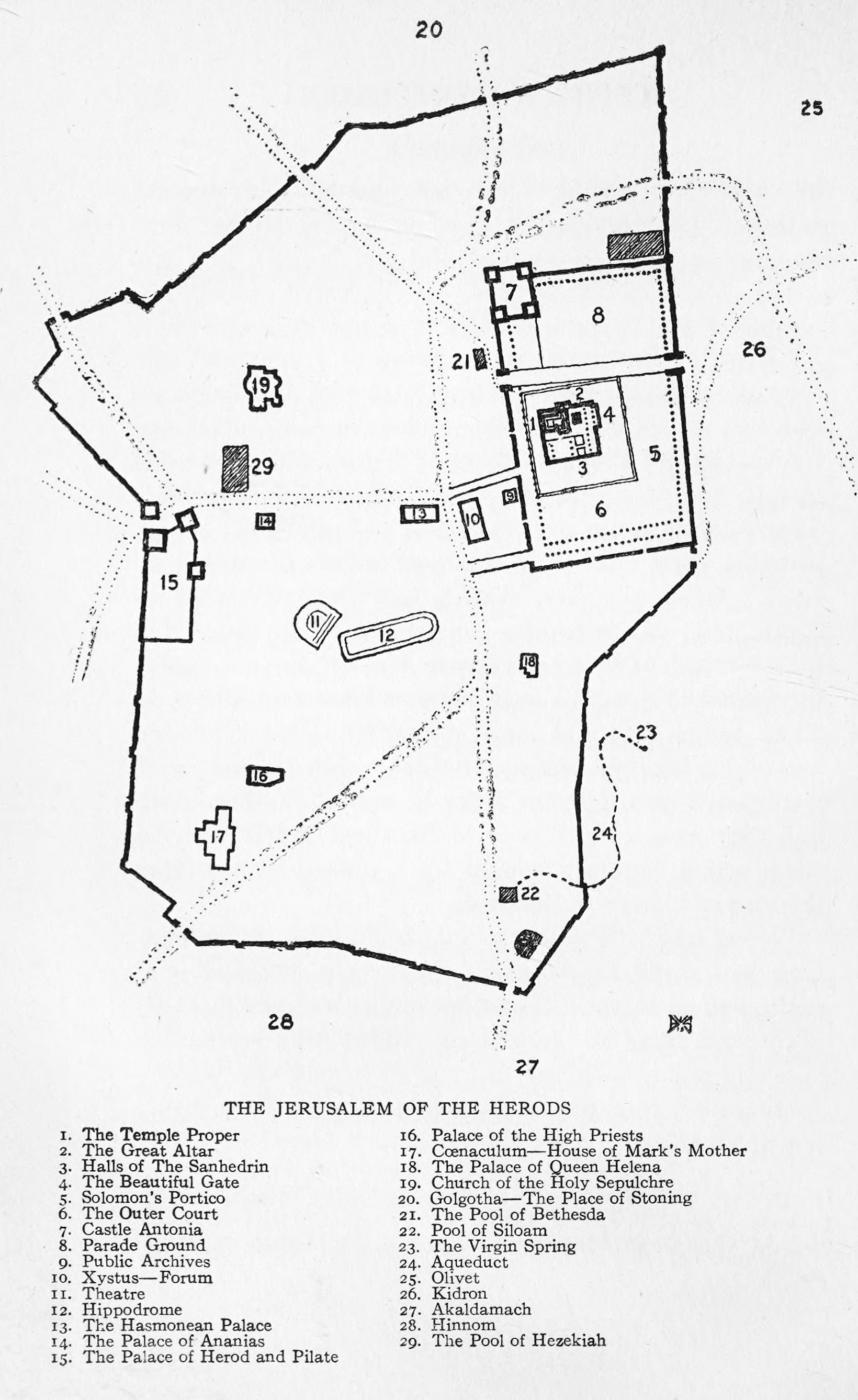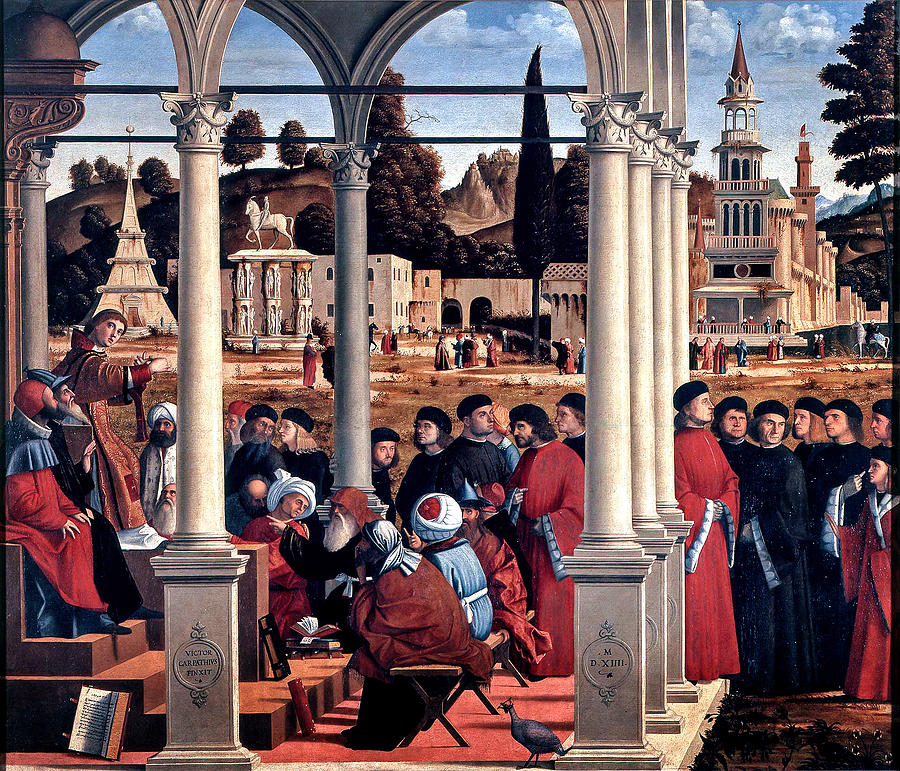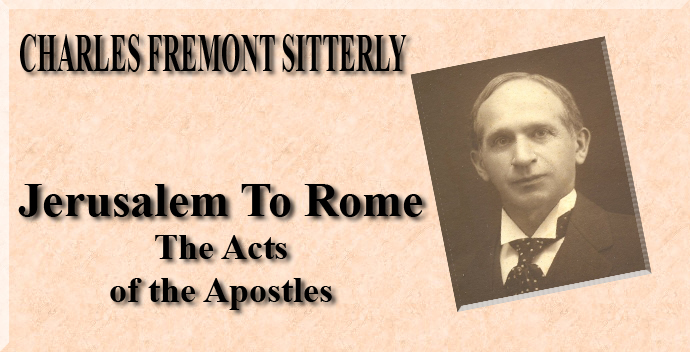Stephen’s Defense and
Martyrdom
|
Translation
|
|
Commentary |
|
Paragraph 1. AN INTERPRETATION OF HEBREW HISTORY. Verses 1-53.
|
|
a. IN THE TIME OF ABRAHAM AND THE PATRIARCHS, Verses 1-8
|
|
Then the High Priest said,
“Are these things true?’ And Stephen replied:
“Brother men and Fathers, hear me. The God of glory appeared to our father Abraham while he was still in Mesopotamia before his residence in Haran, and said unto him, ‘Go forth from your land and your kinsfolk and go unto a land which I will show you.’ Then he left the land of Chaldea and settled in Haran. And after the death of his father God removed him to this land in which you now dwell. Yet He did not give him an inheritance in it, not so much as a foot of the land. He did, however, promise to give it to him for a possession, and to his descendants after him, though as yet he had no children. What God declared was that his descendants should live in a foreign land, where they should be enslaved and oppressed for four hundred years. Moreover, He said,
‘I Myself will judge whatever nation enslaves them, and after that they will come out and will worship Me in this place.’
“He also gave him the Covenant of Circumcision, and in this way Abraham became the father of Isaac, whom
he circumcised on the eighth day, and Isaac became the father of Jacob and Jacob of the twelve Patriarchs.”
|
|
For Stephen’s scholarly defense his hearers were totally unprepared save as his glowing face arrested and chained their attention. If we remember that he was addressing the most learned association of seventy men, not only of his own but of any other nation at that age, with minds like that of Gamaliel and Saul not a few, a company the majority of whom had passed through the scorching fires of Herodian hatred and persecution and who had stood proudly, at any cost to themselves, for the distinctive tenets of strict Pharisaism, we will be the better able to see why Stephen enthralled and at the same time stirred them to the depths of antagonism. Yet so able and easy was his mastery of the dialectic and documents with which they were most familiar that they were compelled to hear him almost if not quite to the finish. He began in tones of the sincerest respect and immediately disarmed any possible interruption by speaking of the heavenly visions vouchsafed to Abraham, which was like music to his listeners’ ears. Tracing rapidly the chief steps in the life of the Father of the Hebrew nation, he pointed out what none could dispute—that even he, obedient and full of faith as he was, did not, during his entire life, possess more than a narrow burial plot in the land of promise, showing that there was nothing inherently sacred nor peculiarly necessary in the local territory or institutions his auditors so tenaciously claimed.
Though finally given a son and the peculiar rite of circumcision as a sign of special acceptance, yet the most outstanding promise of all as to Abraham’s descendants was a period of centuries of slavery and exile before they should be permitted to dwell even
temporarily in their own land and freely worship therein. Thus their chief ancestor died and his successors for hundreds of years lived without possessing the Holy Land. How, then, could such possession be of supreme importance to those who lived by faith?
|

STEPHEN BEFORE THE HIGH
PRIEST
|
Translation
|
|
Commentary |
|
b. IN THE TIME OF JOSEPH AND HIS BRETHREN. Verses 9-19
|
|
“Now the Patriarchs were jealous of Joseph and sold him into Egypt. But God was with him and delivered him out of all his troubles, and gave him favor and wisdom before Pharaoh, King of Egypt, who made him governor over Egypt and over all his own household. Then a famine came over the whole of Egypt and Canaan, bringing great misery, so that our fathers could find no food. Jacob, however, hearing that there was food in Egypt, sent off our fathers for their first visit there. On their second visit Joseph made himself known to his brothers and Joseph’s race became known to Pharaoh. Then Joseph sent and asked his father to come to him, and all his kinsfolk, seventy-five persons in all, and Jacob went down into Egypt. There he and our fathers died, and they were carried over to Shechem and laid in the tomb which Abraham bought for a sum of money from the sons of Hamor at Shechem.
“Now, when the time was approaching for the promise God had made to Abraham the people increased and multiplied in Egypt, till another king who knew nothing of Joseph came to the throne. This king adopted a deceitful policy with our race; he ill-treated our. fathers, forcing them to expose their infants, so that they should not survive.”
|
|
Next to Abraham, Joseph was the greatest Patriarch and at the same time the most perfect prototype of Messiah. But Joseph, it must be recalled, was sold by his own brethren into Egypt and never again lived in his native land. But his sense of the guidance and guardianship of his father’s God was all the brighter for this experience, and through it he was able not only to save his own family from famine but also the land of their exile, showing again that it is not the place but the people that is the sole factor of importance. Here Stephen most adroitly and eloquently dwells on the details of the most moving story in all history and carries his audience along in breathless admiration till the tragedy of the brick kilns brings Moses above the horizon. Now, if Joseph and all the Patriarchs of the nation could enjoy the divine companionship and truly worship Jehovah in a strange land and without any temple or outward ritual, why make such a fetich of temporal conditions or places or institutions as though these constituted the essence of the holy religion?
|
Translation
|
|
Commentary |
|
c. IN THE TIME OF MOSES AND THE EXODUS. Verses 20-38.
|
|
“At this time Moses was born. He was a wonderfully beautiful child, and for three months was brought up in his father’s house. But when he was exposed the daughter of Pharaoh adopted him and brought him up as her own son. So Moses was educated in all the learning of the Egyptians, and was an able man in words and deeds.
“Now, when he had completed his fortieth year it came into his mind to visit his brothers the sons of Israel. And seeing one of them ill-treated, he took his part and avenged the man who had been wronged by striking down the Egyptian. He supposed his brothers would understand that God was using him to deliver them, but they did not understand. Again the next day he came upon two of them fighting and tried to make peace between them. ‘Men,’ he said, ‘you are brothers; why should you injure one another? But the man who was wronging his fellow workman pushed Moses aside.
‘Who made you,’ he asked, ‘ruler and judge over us? You do not wish to kill me, as you killed the Egyptian yesterday, do you?’
“At that remark Moses fled and became an exile in the land of Midian, where two sons were born to him.
“At the end of forty years, there appeared to him an angel in the desert of Mount Sinai, in the flames of a burning bush. And he when he saw it wondered at the sight, and proceeding a bit nearer, heard the voice of the Lord speak out,
‘I am the God of your fathers, the God of Abraham, of Isaac, and of Jacob.’
“And Moses became so frightened that he did not dare to look. But the Lord said to him:
“Take off the sandals from your feet, for the place
on which you are standing is holy ground. Most assuredly I have seen the oppression of my people in Egypt; I also heard their groaning, and I have come down to deliver them. So now come and I will send you into Egypt.’
“That very Moses whom they had rejected when they said, ‘Who made you a ruler and judge?—this very man God sent to be a ruler and deliverer with the hand of the angel who had appeared to him in the bush. This is the man who led them out after he had done wonders and signs in Egypt and at the Red Sea, and in the desert forty years. This is the man who said to the sons of Israel,
‘GOD WILL RAISE YOU UP A PROPHET FROM YOUR BROTHERS, AS HE RAISED ME’ (Deut. xviii, 15, 18).
“This is the man who intervened at the assembly in the desert between the angel that used to talk with him in Mount Sinai and our fathers, who received living words to be given unto us.”
|
|
So adverse had conditions become in Egypt under a change of dynasty that the royal decree soon went forth for the Hebrews to expose to death all their male infants. Under this decree Moses, the next great figure in Hebrew history, was born, and finally perforce exposed. But so divinely beautiful was the babe and so providentially rescued from death that he was spared as by a miracle through the unparalleled clemency of the royal princess. Thus Stephen leaps from peak to peak, by indirection answering any charge of lacking reverence, much less of blasphemy. Had not Moses, indeed, been rejected by his own people, when on coming to maturity he would champion and save them? Had they not by their own faithlessness and perfidy put off for two generations of forty years each their complete emancipation and entry into
Canaan? Here again the orator’s touches of striking fantasy light up and vivify the portrait. Moses’s high learning, his prowess in debate and in the battlefield, his chivalric project to head a racial revolt against the crown, and his compulsory flight because of the taunting threat of one of his fellow nationals, all tend to throw the most commonplace traditions of Hebrew history into new and startling perspective and to compel thoughtful if not favorable consideration. Here again, as in the cases of Abraham and Jacob and Joseph, exceptional favor from on high was shown to Moses while in exile in Midian, where his two sons were born, where the vision of Holy Ground beneath a burning thorn bush was his temple, and where he afterward, even on the smoking crater of Sinai, came to know Jehovah face to face. Yet, note how Stephen closes the paragraph with five resounding blasts, beginning the five clauses from verse 35 on: “that very Moses” . . . “this very man”. . . “this is the man”. . . “this is the Moses” . . . and “this is the man,” contrasting alternately God’s high esteem of him with the low esteem of his own generation. Can a man who speaks with such fervid eloquence about the nation’s Lawgiver be charged with wanting in appreciation of that Lawgiver?
|

THE JERUSALEM OF THE HERODS
|
Translation
|
|
Commentary |
|
d. IN THE TIME OF AARON AND THE MURMURINGS. Verses 39-44
|
|
“But our fathers were not willing to obey him; they pushed him aside in their hearts and turned back to Egypt. They said to Aaron,
‘Make us gods who will go before us. As for this Moses who led us out of the land of Egypt, we know not what has become of him.’
“They even made a calf at that time, and brought: sacrifice to the idol, and kept rejoicing in the works which their own hands had made. But God turned away from them and handed them over to serve the Host of Heaven, as it is written in the book of the Prophets,
‘DID YOU OFFER ME SLAIN BEASTS AND SACRIFICES, FORTY
YEARS IN THE DESERT, O HOUSE OF ISRAEL? YOU REALLY RAISED UP THE TENT OF MOLOCH AND THE STAR OF THE GOD REPHAN;
THOSE WERE THE IDOLS WHICH YOU MADE TO WORSHIP} THEREFORE I WILL EXILE YOU BEYOND BABYLON’ (Amos v, 25-27).
“Our fathers had the Tent of the Testimony in the desert as directed by Him, who told Moses to build it after the model which he had seen.”
|
|
Finally, Moses the unselfish deliverer, even redeemer of his race, who at the end of his course prophesied that its ultimate redemption should be wrought out by his spiritual antitype, even Messiah, “Our fathers were not willing to obey, but pushed him aside” as the brick-maker had in Egypt, asking in the very same words the impertinent question, “Who made you ruler over us?” while Aaron, whom Moses had made High Priest, they invited to set up Bull-worship, such as they had seen and been taught to abhor in Egypt. They even said these blasphemous words about Moses as the Holy Writings have preserved against them, namely, while he was in Horeb receiving further laws from Jehovah, “As for this man who led us out of the land of Egypt, we know not what has become of him!” And Aaron, the High Priest, was their willing tool, and so were other chief elders among them! Surely, the Almighty could do no less with such traitors than to strike them with leprosy and even sudden death, or than what He later said, by His gifted prophet Amos, He would do to those who worshiped the
bulls at Bethel and at Dan, drive them like chaff into the remotest exile beyond Babylon. Has the Hebrew nation ever appreciated or listened to its deliverers or heaven-sent teachers until it had first rejected and killed them? Did they not make the tabernacle a tent of Moloch and of the Temple a house of the Host of Heaven?
|
Translation
|
|
Commentary |
|
e. IN THE TIME OF JOSHUA AND THE KINGS. Verses 45-50
|
|
“When they had received it our fathers brought it in as they took possession with Joshua of the land of the Gentiles whom God drove out before them. So it continued down to the days of David. He found favor with God and asked permission to provide a dwelling for the God of Jacob. But it was Solomon who built a house for Him. Yet the Most High does not dwell in houses made by hands: just as the Prophet declares:
‘HEAVEN IS My THRONE
And EARTH IS THE FOOTSTOOL FOR My FEET.
What House WILL you BUILD ME? SAITH THE
Lord,
Or WHAT PLACE IS THERE FOR ME TO SETTLE DOWN?
Did nor My HAND MAKE ALL THESE THINGS?’ ” (Isaiah
lxvi, 1, 2). |
|
While in the desert Moses superintended the gathering of materials and their beautiful coordination and erection into a pavilion gorgeous beyond the dream of any Arabian king. Its textures, colors, measurements, and varied materials each had particular significance, carefully copied after the spiritual model which appeared in his Sinai visions, and not a little influenced by his memories of Egyptian temples and their furnishings. But it was the spiritual lessons it bodied forth which were important, and these all fell as good seed upon stony ground. Though Joshua had been at Moses’s right hand from his earliest Egyptian years, and was so fortunate as to escape every criticism and with Caleb to enter into and lead in the conquest of Canaan, yet both these veterans gave their later years almost wholly to personal aggrandizement, and, having set up the Levitical Tabernacle and priesthood at Shiloh, themselves settled at points distant from that center, and so little of honor came either to it or to Jehovah’s name until the times of David. Why this paragraph is so brief, and especially why no mention is made of Samuel, is doubtless due to Stephen’s perception that the patience of his audience cannot stand much longer strain. Only a single line is given to the ideal personage, hero king of every Jewish household, great David, and even he never enjoyed nor was permitted even to build the Temple his heart so fondly desired. Thus during all the long centuries from Abraham to Solomon no permanent place nor habitation was associated as by necessity with divine worship; and when at last the climax of that proud history was reached as a separate nation and a world capital and court and Temple, with its hundreds of priests and Levites and musicians and servitors, was achieved, even Solomon in all his wisdom and glory could not save the people from immediate disruption and decline, so that the moment of Israel’s highest success was also that of its complete collapse as a spiritual commonwealth. For God does not dwell in human structures. Such buildings are more likely to be hindrances than helps to spiritual worship, unless the chastened mind and heart keep clearly in view their temporary, and symbolical limitations, and humbly use them as mounting stones to unseen realities. Isaiah, the Abraham, Moses, Solomon of the exiled and most fruitful period of all their history, had told them this; and so had Hosea and Jeremiah and Ezekiel and a host of faithful and fearless prophets, who set small store by outward pomp and ceremony, for God is a Spirit, and they that worship Him must worship Him in spirit and in truth.
|
Translation
|
|
Commentary |
|
f. IN THE TIME OF MESSIAH HIMSELF. Verses 51-53 |
|
“You stiff-necked race, uncircumcised in heart and ears! You are always resisting the Holy Spirit. As it was with your fathers so is it with you. Which of the Prophets did not your fathers persecute? They even killed those who told long beforehand the coming of the Just One, whose betrayers and murderers you have now become! You who received the Law ordained by the angels and yet have not kept it!”
|
|
Stephen sees that he will be granted but a moment more. He drives his sword to its very hilt. You, you are true sons of your sires—you revert to type, as surely as the needle seeks the pole. Circumcised you verily are, but only in flesh and name—your hearts are utterly impenitent; you never knew a moment of sincere worship. Like fathers, like sons; you seek to silence by assassination the voices you cannot answer, just as did they always. Yours the Patriarchs, yours the Law, yours the Temple, yours the Prophets, and to what end? You have no mind for the messages of your Prophets; your Temple is the house of Mammon; your Patriarchs walked by Faith, but you by sight; though you received the Law at the hands of angels, you have not kept one jot nor tittle.
|
Translation
|
|
Commentary |
|
Paragraph 2. STEPHEN’S MARTYRDOM. Verses 54-60. |
|
While listening to these words they became frantic with rage and gnashed their teeth at him. But he, full of the Holy Spirit, looked steadily toward Heaven, and saw the glory of God, and Jesus standing at God’s right hand.
“Look,” he said, “I see Heaven opening wide, and the Son of Man standing at the right hand of God.”
But with a loud shout they stopped their ears. All rushed with one impulse upon him, dragged him outside the city, and began to stone him, the witnesses throwing off their garments and casting them at the feet of a young man called Saul. Thus they stoned Stephen while he kept calling on the Lord and saying,
“Lord Jesus, receive my spirit!”
Then rising on his knees, he cried with a loud voice,
“Lord, do not charge this sin against them.”
And when he had said this he fell asleep. Now Saul was one of those who fully approved of his murder.
|
|
Saul can endure no more. Even Gamaliel does nothing to stem their mad frenzy. With one impulse the throng rushes in mob violence upon its victim, the young fanatic from Tarsus in the lead. But Stephen stands rapt in ecstatic vision. He sees beyond mortal sight. The entire Godhead appears to sanction his view of Israel’s shortcoming. The Spirit fully possesses his soul. The Father sits on His throne of judgment, and the Son stands ready to welcome him to glory. Saul hears and can never shake from his memory those last words as Stephen testifies to the divine approval. Demon-driven, however, all stop their ears, and falling upon their prey, easily overbear and drag him outside the city gate. Murder by stoning was the ecclesiastical and merciful type of release then in vogue, and Saul, younger than the foremost hierarchs and better able to keep up with the mob, unctuously takes his stand on a hillock near by, and in the name of his elders gives
official sanction and oversight to the scene. Thus he has to hear, his eyes riveted on that angelic face, still further blasphemy. The man keeps calling on Jesus as Lord—he commends his spirit to the same Jesus as though He were God. He even rises when in the throes of death upon his knees and pleads that this killing may not be counted as sin against his executioners, nor especially against him who has formally assumed all responsibility. Finally the stones have done their work; the peerless soul has been released. The voice is silenced at last, the eyes lose their luster and the shining face relaxes as in sleep.
How merciless an historian is Luke!—on the soul of Saul rests the guilt of the martyrdom of Stephen.
|

STEPHEN’S ADDRESS TO THE
SANHEDRIN |
|
|
|
|



 Home
Home What's New
What's New Bible
Bible Photos
Photos Hiking
Hiking E-Books
E-Books Genealogy
Genealogy Profile
Free Plug-ins You May Need
Profile
Free Plug-ins You May Need
 Get Java
Get Java.png) Get Flash
Get Flash Get 7-Zip
Get 7-Zip Get Acrobat Reader
Get Acrobat Reader Get TheWORD
Get TheWORD

